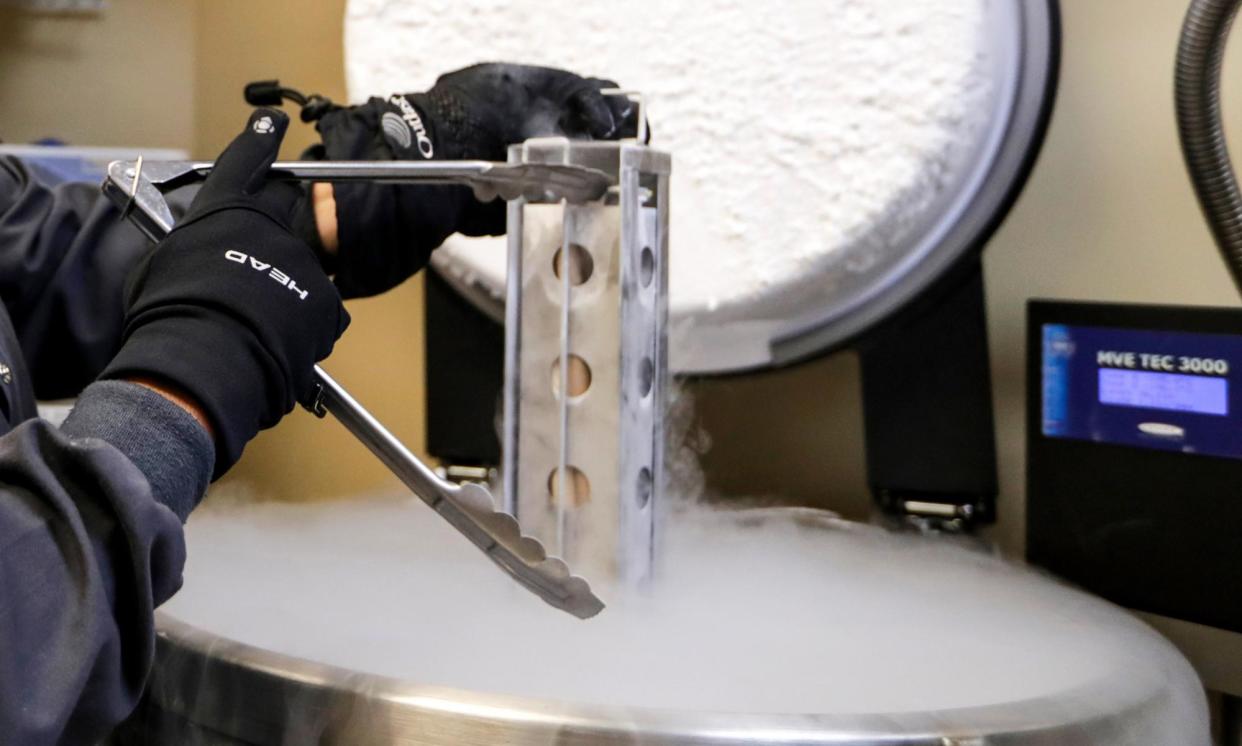Alabama supreme court rules frozen embryos are ‘children’

In a first-of-its-kind decision, the Alabama supreme court ruled Friday that frozen embryos are “children”, allowing two wrongful death suits against a Mobile fertility clinic to proceed. The decision could have sweeping implications for people seeking in vitro fertilization (IVF) or other assisted reproductive technology treatments and could increase criminalization of expectant people.
In 2021, a patient at Mobile’s Center for Reproductive Medicine wandered into the clinic’s cryogenic nursery and removed several embryos. According to the lawsuit, “the subzero temperatures at which the embryos had been stored freeze-burned the patient’s hand, causing the patient to drop the embryos on the floor, killing them”.
The three couples who lost their frozen embryos sued for wrongful death, but the clinic claimed that Alabama’s Wrongful Death of a Minor Act did not apply to embryos outside of the womb. Mobile county circuit court judge Jill Parrish Philips agreed with that argument and ruled to dismiss the case, but the state’s supreme court threw it out last week.
Alabama supreme court justice Jay Mitchell wrote that embryos are indeed protected under the state’s existing law: “The central question presented in these consolidated appeals, which involve the death of embryos kept in a cryogenic nursery, is whether the act contains an unwritten exception to that rule for extrauterine children – that is, unborn children who are located outside of a biological uterus at the time they are killed,” he wrote. “Under existing black-letter law, the answer to that question is no: the Wrongful Death of a Minor Act applies to all unborn children, regardless of their location.”
Since Roe v Wade made abortion legal in all 50 states 1973, many anti-abortion advocates have pushed for the introduction of personhood amendments, or, amendments that would grant fetuses and embryos the same rights as living, breathing children. Though Roe was overturned two years ago, anti-abortion advocates have continued to push for the implementation of personhood laws.
Since the mid-1980s, almost 40 states have passed fetal homicide laws, and multiple states have prosecuted or attempted to prosecute women for their actions while pregnant. The Alabama supreme court, for instance, previously ruled that the state’s chemical endangerment law could be used to prosecute women who use drugs during pregnancy. In 2018, Alabama voters passed a ballot measure granting fetuses full personhood rights, but the measure did not note whether that applied to frozen embryos.
The Alabama supreme court’s ruling repeatedly references God and the sanctity of life, citing the Bible and biblical scholars including Petrus van Mastricht, Thomas Aquinas and John Calvin. Chief Justice Thomas Parker wrote: “Human life cannot be wrongfully destroyed without incurring the wrath of a holy God, who views the destruction of His image as an affront to Himself … this is true of unborn human life no less than it is of all other human life – that even before birth, all human beings bear the image of God, and their lives cannot be destroyed without effacing his glory.”
Justice Greg Cook, the lone dissenting judge, argued that the decision should have been a legislative one, not a judicial one.
“It is not my role to judge whether ending this medical procedure is good or bad -- but it doubtless will have a huge impact on many Alabamians. And it underscores the need to have the legislature – not this court – address these issues through the legislative process.”
The recent decision will probably elevate the issue of personhood ahead of the 2024 elections.